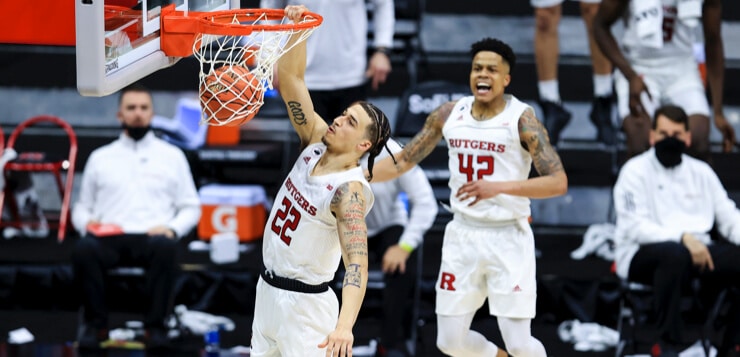The Rutgers men’s basketball team lost to Arizona State in the first round of the NCAA March Madness tournament on March 15, 1991 — just three weeks after the Professional and Amateur Sports Protection Act (PASPA) was introduced by U.S. Sen. Dennis DeConcini (D-Ariz.).
PASPA was born the following year on Oct. 28 when lame-duck President George H.W. Bush signed the bill into law. It died on May 14, 2018, when the U.S. Supreme Court invalidated that federal law as unconstitutional “commandeering” by the federal government over the rights of state government powers.
And in PASPA’s entire 26-year run, the Rutgers men never punched a ticket to a March Madness.
But the 30-year drought is over, and now the 10th-seeded Scarlet Knights will take on No. 7 Clemson at 9:20 p.m. Friday in Indianapolis.
There’s just one catch for Rutgers alumni such as former state Sen. Ray Lesniak, who led the charge to repeal PASPA and allow any state to replicate the Las Vegas-style sports betting mostly limited to Nevada.
The Jersey twist
There is no way to bet legally on this Rutgers basketball game in New Jersey. The limitation preventing wagering on New Jersey-based schools, or on games played in NJ, was part of a compromise Lesniak worked out to expedite the process of getting a statewide referendum on sports betting on the ballot in 2011.
That approval led to a bill signed into law by Gov. Chris Christie in 2012 — and to a suit by the NFL, NCAA, and three other plaintiffs against the state to prevent state racetracks and Atlantic City casinos from offering such wagering. Six years later, New Jersey triumphed.
So for faculty and for students 21 and older, placing a few dollars legally on Friday’s game would entail a drive of about 60-90 minutes from the New Brunswick campus to a variety of eastern Pennsylvania casino locations (or 45-50 minutes to cross the border into Pennsylvania to set up a mobile account from, say, a strip mall parking lot).
The nearest Pennsylvania casino location from campus is about 45 miles away at Parx Casino and Racing in Bensalem Township — located in Bucks County, northeast of Philadelphia.
From anywhere in Pennsylvania, those Rutgers fans would be looking at a point spread of Rutgers favored by 1.5 points over Clemson in spite of being the lesser seed. Or using the moneyline, one can bet on Rutgers to win at -124 odds, or $124 risked to win $100 more, if the Scarlet Knights win the game by any score.
Those numbers are the same on FanDuel, on DraftKings, and on any other sportsbook in the state powered by Kambi.
Sometimes it pays to shop around
But if a fan has bigger dreams for Rutgers, FanDuel Sportsbook is the way to go. There a bettor can get 24/1 odds on Rutgers winning four games to reach the Final Four — as it did in 1976. Rutgers cutting down the nets as champions? That’s a 150/1 shot.
But at DraftKings, you’re only getting paid out on 18/1 odds should the Scarlet Knights reach the Final Four, and 70/1 odds should they win the tournament.
Lesniak, reached by NJ Online Gambling as he waited to hit his tee shot on the second hole of a Florida golf course on Wednesday, said he is predicting a run to the Elite Eight for his Scarlet Knights — after correctly predicting last fall that Rutgers would return to “the dance” this year. Lesniak could get 9/1 odds on that on DraftKings in Pennsylvania if he wasn’t still going to be in Florida — which doesn’t allow legal wagering on any sports except horse racing.
“It’s a good team that plays tough defense, and if we’re hitting our shots we can beat anyone,” said Lesniak, a 1971 graduate. “It’s been a long and disappointing journey, but the future is bright. I’ll be down here watching the game at a sports bar.”
Still, even diehard fans sometimes have their limits. Asked about the 150/1 win-it-all odds, Lesniak conceded, “That’s not going to happen.”
This is not the first time that the ban on New Jersey contests has impacted March Madness. In the previous tournament in 2019, Seton Hall and Fairleigh Dickinson each qualified for the tournament — though each lost in the round of 64. FDU won a play-in game before falling to top-seeded Gonzaga. The 10th-seeded Pirates, meanwhile, were ousted by Wofford.
PASPA and a small world
A 2013 paper by Professors Ryan Rodenberg and Anastasios Kaburakis called “Legal and Corruption Issues in Sports Gambling” contains a reference to a Sept. 24, 1991, letter — six months after Rutgers’ last March Madness appearance — that was sent from Assistant Attorney General W. Lee Rawls to the then-chairman of the Judiciary Committee.
Rawls wrote that he found a “particularly troubling” provision of PASPA gave a unique power to the five sports organizations to sue any state to ensure enforcement of the ban.
More than 25 years later, the majority of the Supreme Court found PASPA troubling enough to reject a suggestion by two judges that PASPA be limited rather than erased entirely.
The two U.S. Third Circuit Court of Appeals judges whose ruling was nullified by the nation’s top court were Marjorie Rendell — the then-wife of former Pennsylvania Gov. Ed Rendell, whose backing of legalization of casinos in his state led Lesniak and others to seek new gambling options to help Atlantic City’s casinos — and Maryanne Trump Barry, the sister of former President Donald Trump.
New Jersey was the lone state under PASPA to gain a one-year extension for 1993 to legalize sports betting — and Trump, who then owned several Atlantic City casinos, campaigned for legalization.
As for that Judiciary Committee chairman who received the 1991 letter, that would be one Joe Biden, the man who defeated Trump in November to ascend to the presidency.








